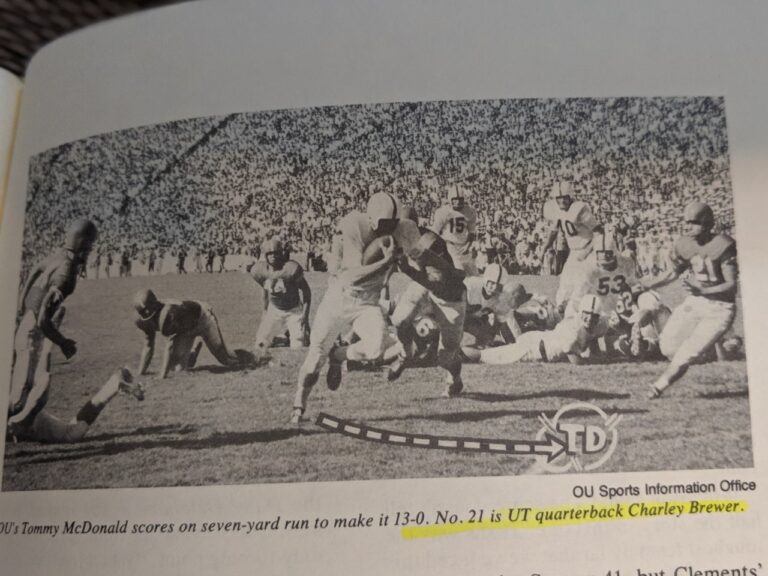Which is harder starting or maintaining a winning tradition?
There is more than just talent involved in starting and maintaining winning traditions. Coaches who excuse defeat because the other team has more resources and a year-round developmental program, miss the point and will continue to lose. Starting or maintaining a winning tradition begins with attitude, discipline, and execution. Of these three variables, discipline is the cornerstone for winning.
Is it harder to start a winning traditional or maintain one?
Most individuals will answer “maintain,” but I am not sure that is correct. Most teams never establish a winning tradition, so the numbers say starting is more difficult than maintaining. While all winning traditions eventually end, some teams nurture a winning formula for years. Alabama, Odessa Permian, Converse Judson, Plano, Daingerfield, Texas Longhorns, Dallas Cowboys, Green Bay, New England Patriots, and many other teams are great examples.
DKR disagrees with my opinion stating, “Climbing is a Thrill, but maintaining is a bitch,” yet it took him only four years to start a winning tradition that he maintained for most of the next 16 years.
Every year, winning programs pass their legacy of core values, including culture, traditions, attitude, and work ethic, to the next team up. Winning coaches know how to do this! Winning coaches know that Teams must work with one heartbeat to maintain a winning culture. Coach Royal and Coach Brown had the qualities necessary to transition greatness to the Next team-up.
However, most teams will never reach this level. It is too difficult to overcome all the individual, mental, and logistical obstacles to start a winning tradition. As Coach Akers said, a “winning culture is a state of mind that leads to wins against bigger, better, and faster teams.” Most teams never reach this level.
Nathan Kaspar talks about trust
Walk-on Nathan Kaspar was asked in his recent interview with Professor Larry Carlson: “ Looking back, how would you describe Mack Brown as a coach, leader, and face of Texas football during your playing days? Texas was starting an incredible run of ten-win seasons at that time.”
Nathan’s story is at the link:
>
““When I was enlisted in the Navy, an old Master Chief defined leadership as “Being able to tell someone to go clean a toilet, and have them WANT to do it.”Mack Brown had that leadership trait. He was very matter-of-fact with walk-ons. He’d tell us what our role was, that we needed to know it and do well with it, and if we did, we’d get a shot at playing time….. But that we needed to not ever, under any circumstances, ask about playing time. They’d tell us. He was true to his word on that subject. He would also tell the scholarship guys that he was going out every weekend trying to recruit them out of their position. We knew what we had to to do to earn his trust, and we knew that if we got on that field on Saturday that we’d earned his trust. He always treated everyone with the dignity and respect that made you want to earn his trust. When we lost, he took the blame even when it wasn’t his fault. When we won, he gave all the credit to the players and staff.
One of the things that Mack talked about was staying even emotionally. Sometimes it would seem like the world was falling apart, and there would be Mack, clapping on the sidelines not worried at all. We’d have screwed up and fallen behind, and he’d tell us at half-time what we needed to do to win and what the score would be. Then, we’d come back and win. I lost track of how many games we won through the years on last-second kicks or final drives. We always believed we’d win, and nobody ever freaked out because of extra pressure from the coach. Mack was great about instilling confidence in his players.
”
A Winning Tradition needs visionary leaders who know how to motivate young men.
Starting a winning tradition is a complicated process. First, coaches must define team goals and values tailor-made for diverse players with different backgrounds, personalities, skill sets, and career goals. Unfortunately, most coaches fail at this stage. Most Coaches choose template-driven programs instead of custom-made programs, guaranteeing a losing program. The team will only win if the players buy into the Coach’s template.
If starting a winning tradition was easy, there would be many more winning sports teams, but there are not! It takes time to embed winning groupthink in an amalgamation of players with competing agendas. Winning traditions will start once all the athletes share the same foxhole mindset and one heartbeat necessary to reach common goals.
NEGATIVITY IS TOUGH TO OVERCOME
Psychological barriers are self-limiting. Winning starts in the mind. Don’t allow others to define you. Define yourself. Teams have to believe they can do it, so teams must block out the noise and think they can win.
Negative thoughts are evolutionary walls built to protect egos from failure. It is easier to say “no,” reject an idea and move on. It is easier to justify “we can’t” than to believe “we can.” As a result, limitations are created, and the motivation to improve one’s abilities is diminished.
Negative thoughts make it difficult to adapt to new ideas. Losing attitudes become a benchmark mindset that will feed a losing program. Negative thoughts limit an individual’s ability to improve. If enough team members say, “We could never do that,” their destiny is pre-determined. This happens more often than not.
Belief leads to a winning attitude, but belief must be instilled in the unconscious mind as the part that dictates beliefs. The conscious thoughts of players must be willing to analyze, criticize, reason, accept, and reject strengths and weaknesses must be a part of the unconscious mindset to win. It is tough to reach this level. Longhorn volleyball coach Mick Haley once said, “His Team Still Doesn’t Know How To Be Winners. They Are Now Just Getting Into The Habit.”
The race to the 4-minute mile demonstrated that the most significant limitations often occur in our minds, not on the playing field. After Bannister broke the 4-minute mile, the mental barrier was lifted, and many others in the next six months also broke the 4-minute mile.
Breaking the 4 minute mile
Roger Bannister
Teams that win do so by converting negativity into positive thoughts. Positive thoughts make the team more receptive to future changes and creativity, which leads to the completion of team goals.
Unfortunately, most teams never build the mental infrastructure to start a winning tradition. As a result, a team foxhole mentality is never dug, team bonds are not formed, respect is not earned, trust is not confirmed, collaboration is non-existent, and confidence is lacking.
Most teams fall victim to common failures that affect any collaborative work. These failures often stem from changing goals and circumstances for each new team. Winning teams know how to transition with new team members and adjust for team members who graduate. Winning programs maintain culture, discipline, tactics, strategy, and clear communication with the new team’s goals.
The Foxhole and One Heartbeat
A team bond is formed when all the players are in the same “foxhole” fighting for the same cause.
>
“War is horrible for the participants but for those who survive “the foxhole,” a bond is established that lasts a lifetime. Once, when he had risked his life against all odds to charge bravely against the Germans, World War I Medal of Honor winner Sgt. Alvin York was asked why he had done it. There were hundreds of the enemy, and at times he seemed to be all alone. “Did you do it for the glory?” a cynic asked. “No,” said York. “Well, then,” asked the reporter, “were you thinking of your family back home?” “No,” York said again. “Your country, then?” the question came. “Nope,” York said. “Well, why then?” asked the frustrated reporter.”Why did you do it?” “I did it,” said York, “for the guys in the fox hole with me.””
Competitive team sports are not a war with life-or-death consequences. It is just a game, but it still requires “foxhole” bonding for those entering the competitive sports arena.























